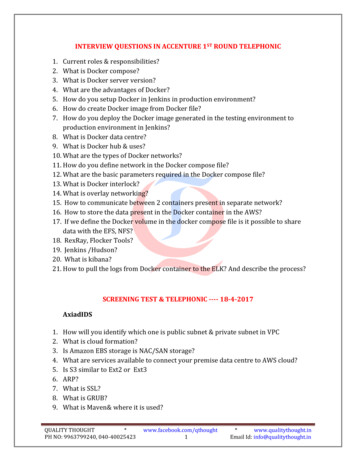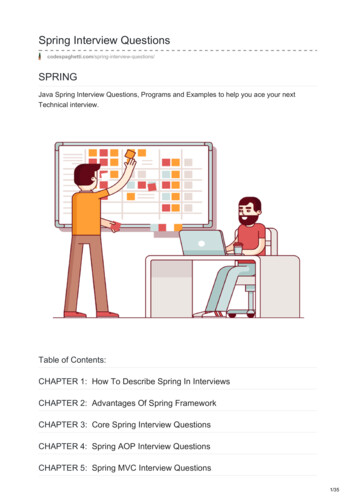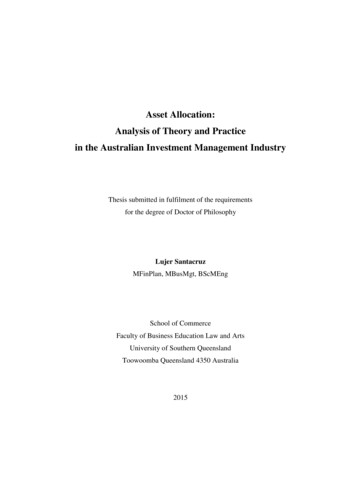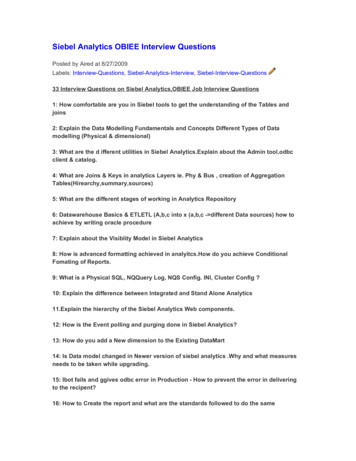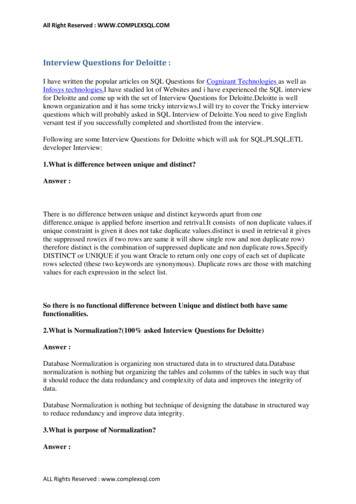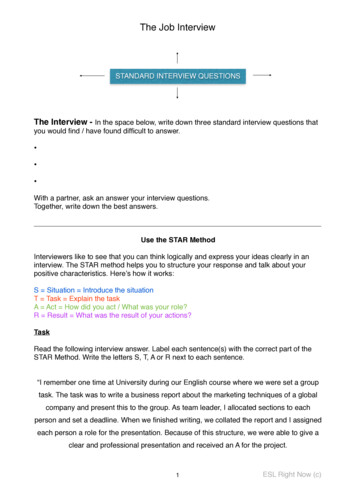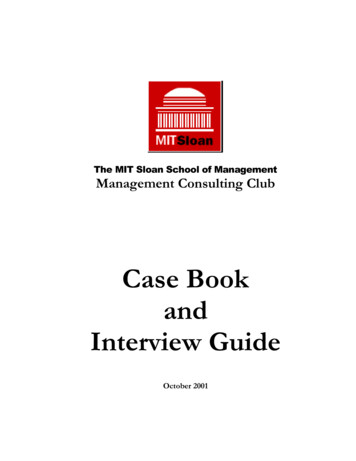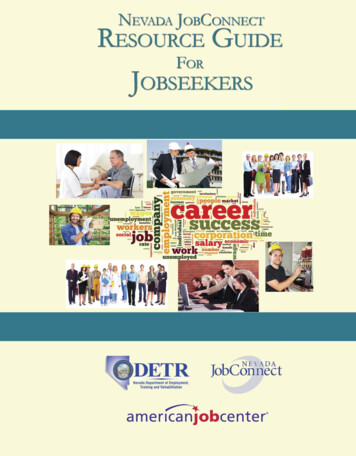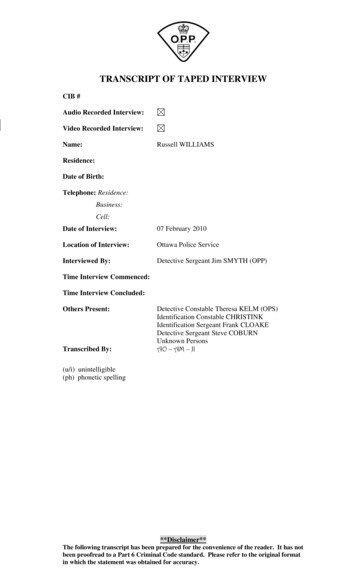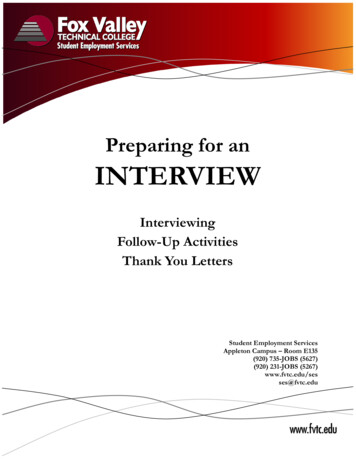
Transcription
Preparing for anINTERVIEWInterviewingFollow-Up ActivitiesThank You LettersStudent Employment ServicesAppleton Campus – Room E135(920) 735-JOBS (5627)(920) 231-JOBS (5267)www.fvtc.edu/sesses@fvtc.edu
Table of ContentsFox Valley Technical College Student Employment ServicesPageNumbersInterviewing and Follow-up ActivitiesInterviewingInterviewing Overview and Tips . .Research and Personal Inventory .Interview Questions of All Kinds Typical Traditional Job Interview Questions Situational Job Interview Questions .About Behavioral Job Interview Questions .Behavioral Job Interview Questions .Dealing with Illegal Interview Questions .Interview Questions for YOU to Ask .Telephone Interview Types Prepare for your Telephone Interview .134578911121415Follow Up & Thank YouFollow Up & Thank You Letters .Job Interview Thank-You Examples .Other Types of Thank You Letter Examples Other Follow-up Activities .17192123
Interviewing Overview and TipsPreparationDo your research (See page 3) Company/business/organization history and area competition Product/Services details Specific job details Wage/Salary range (to help you define your expectations and determine your bottom line)Prepare a personal inventory (See page 3) Include your skills, specific areas of knowledge, and traits. Figure out why you should be hired over the other people who will be interviewed.Prepare your answers and questions (See pages 4-15)See pages 4 to 15 for more information on questions to answer and ask. Illegal questions – know what they are and how to handle them. Traditional questions – know your strengths, weaknesses, goals, why you want the job, why theyshould hire you, etc. Behavioral questions – know specific past examples that demonstrate your job teamwork, stress,conflict, communication skills, problem-solving ability, project completion, etc. Questions you’ll ask about the company and jobPrepare references(See the FVTC Guide on Resume and Cover Letter Writing) Complete a reference sheet Obtain permission from everyone on your reference sheet or application form. Inform your references by phone/email or in person and review your qualifications and skills withthem. Email your resume and cover letter to your references.Practice and Study Go over and over possible question answers. Practice elaborating on and justifying your resume and cover letter contents. Do at least one mock interview.Getting Ready to GoAssemble things to take to the interview Paper and appropriate pen to take notes, write names, and jot down questions to ask later Prepared list of questions to ask about the company and job Copies of your resume and cover letter (one for you and additional copies to share) A copy of your reference sheet Portfolio or examples of previous work illustrating your skillsKnow your location Map out and write directions to your interview location or use a location finding website such as:MapQuest, Google Maps, etc. Write down the company’s telephone number on your directions in case you need it en route. Determine a conservative travel time schedule, including time to relax and mentally prepare.Dress nicely and look professional head to toe Wear clothes that are professional looking and at least one level up from the clothes worn on the job. Clothes should be both clean AND well pressed. Shoes should go with the outfit and be polished/clean. NO jeans, t-shirts, shorts, clothes that show inappropriate amount of skin, sandals, tattoos, flip-flops,caps, hats, athletic shoes, gum, or fragrance. Avoid cigarettes, alcohol, onions, and garlic beforehand. Use a limited amount of jewelry and no body piercings except ear piercings. Wash your hair, groom and style it with a good cut. Trim your beard and clean your hands and nails.1
Be on time 10 minutes early is on time On time is late Late is unacceptableAt the interview (See pages 16-18 for information specific to telephone interviewing)Demonstrate confidence Use a firm handshake, be personable and refer to people by name. Use good eye contact, smile, and actively listen. Emphasize the skills, abilities, and experience that you know the job requires. Speak clearly and talk easily, but not too much. Keep a positive and friendly attitude. Don’t panic. Pause if you need to think, saying, “That’s a good question. Let me think for a moment”. Don’t fill time with nervous “You know”s or “Umm”s, pen/finger tapping, or other nervous bodymovements. Stay cool and upbeat by thinking of and believing positive self-messages.Be polite Wait to be seated. Actively listen. Listen without interrupting. Respond to your interviewer by smiling, laughing, and answering appropriately. Don’t speak negatively about companies or individuals (especially previous employers). Use standard English without slang or profanity. Thank interviewers and ask for their business cards for important contact information.Answer and ask questions Be organized in your responses. (If you’re prepared, this is easy to do). Be fairly brief, but with enough detail to answer fully. Ask for clarification or an example if you don’t understand the question. Don’t answer with a simple YES or NO. Focus on the positive, not on problems. Relate your answers to work or academic situations, not personal ones. In your answers, demonstrate your enthusiasm, motivation, adaptability, determination,communication skills, initiative, and ability to learn quickly, sense of humor, and hard-working andteam player attitude. Answer honestly; don’t even think of stretching the truth about skills, jobs, education, or employmentgaps. If you feel your answer may have not met the interviewer’s need, politely ask and clarify if needed. Ask your own questions to demonstrate listening skills, research, interest, motivation, AND to helpyou determine if the company and position are right for you. Ask for a defined interview/decision-making deadline and if you may call at that point. If true, express your strong interest in the position.After the interview (See pages 19-24 for more information on post-interview follow-up activities) Send an individual handwritten thank-you card AND/OR an email message to your interviewers within24 hours of the interview. Follow-up with a brief phone call if you have not been contacted by the defined deadline. If you don’t receive an offer, continue to network with this company and ask for other contacts.2
Research and Personal InventoryCONGRATULATIONS! Your resume and cover letter worked! You have an interview! Now you have toprepare for your interview through research and the development of a personal inventory.Research the Company or OrganizationThis will take some time but it’s a MUST for two reasons. The first is to demonstrate your knowledgeand interest in the organization to your interviewers. This alone could mark the difference betweenyou and all other candidates and land you an offer. Richard N. Bolles, employment specialist andauthor (What Color Is Your Parachute) wrote of a graduating senior whose interview ended abruptlywhen the senior couldn’t tell the IBM college recruiter what IBM stood for. Why should an employerconsider investing time and money in you knowing you won’t even take the initiative to do basicresearch?So dig into company literature (ask for it or go pick it up), the company website, other online resources(just google the company name for hits), and newspaper archives. Connect with a chamber ofcommerce and any contacts you may have who are associated with or know about the organization tofind out about the company. Learn as much as you can about the history, products/services, mission,current goals/projects, as well as the current employment scene and specific opening. Also, considerresearching the organization’s competition. All of this information will help you respond intelligently tointerview questions.The second reason is to help you decide if this particular business is a good match for you. Ofcourse, you’ll learn a lot about the organization at the interview, but the information you pick up fromyour research before the interview will enable you to formulate a sense of whether you want to investyour future in this organization. From your research, you can start a list of questions that you wantanswered. At appropriate times in the interview process, you can ask these questions to help youdecide if you want to continue to be considered for employment.Preparation for salary or wage discussions Get as much salary or wage information as you can fromthe organization beforehand. The job posting may include some information. Use various online andprint resources to determine a range of appropriate pay for the level and type of position you’reapplying for in your geographic area. Your local chamber of commerce, employment agencies,university and technical college career and employment departments, and public libraries havesalary/wage information in print. Program salary information is available from Student EmploymentServices for entry level positions for the past 5 years. There are many online websites offering freewage range information. These include www.salary.com, www.payscale.com, andwww.salaryexpert.com.Prepare a Personal InventoryBefore you have your interview, make an inventory of your skills, areas of expertise, training, strengths,weaknesses, personal work traits, interests, and areas of knowledge, etc. Create a list of these withsome detail. Add to this inventory as you progress in your career. Review it before every interview sothat you grow in confidence and can more effectively market yourself. Prepare for each interview byselecting the inventory information that is most relevant to that position. Choose 3 or 4 areas that youwant to really feature about yourself during the interview. It is crucial to have confidence and know howto make yourself shine in comparison to all the other candidates being interviewed.3
Interview Questions of All KindsYou may have only one hour or less to express yourself with confidence and align your skills set and strengthswith the requirements of the available position and the organization’s or department’s goals. Good preparation forall kinds of questions will help assure that this hour will propel you further along in the hiring process.Most interviewees under-prepare for possible interview questions. You may be the most qualified skill-wiseof all the interviewing candidates, but lose the job offer to the person who knows how to interview the best!Prepare! You don’t want to fail to impress the interviewing team because of your: incomplete or poor responses, many “Umm.”s and “Ahh ”s, long pauses, or anxiety due to lack of good preparation.Richard N. Bolles’ online article The Two Minute Crash Course on Interviews states that all interviewingquestions can be narrowed down to just five essential questions: Why are you here? (What is it that attracted you?) What can you do for us? What distinguishes you from 19 other people who can do this same job? Will you fit in? (Will you get along with or irritate all my other employees?) Can I afford you?Start planning your answers carefully.How these five questions are asked depends on the question types used by the interviewers. Essentially, thereare four basic types of interview questions:1. Traditional – These questions are standard questions that many recruiters, hiring managers, andsupervisors use. They focus on your goals, strengths/weaknesses, educational and work history, skills,etc. They are asked in a straight forward manner.Examples:What are your short-range and long-range goals and objectives? Howwould you describe yourself? Tell me what you know about our company?2. Situational – The interviewer describes a hypothetical situation or task that you may likely face in theposition and you must respond as to how you would handle the situation or complete the task.Example:Your co-worker fails to complete projects on schedule negatively impacting yourwork. How would you deal with this situation?3. Behavioral – Recent research shows that these questions are better predictors of future job behavior andperformance than traditional or situational questions. Many companies therefore use this question typeexclusively. Your answer should include a description of an actual past situation or task, the actions youtook, and the result of those actions. Behavioral questions are difficult to answer well and definitelyrequire preparation.Examples:Give me a specific example of a time when you used good problem-solving skills.Tell me about a time when you had to deal with a difficult person. How did youhandle the situation?4. Illegal – These are questions that you should NOT be asked, but which you must be prepared for. Whatmakes them illegal is that federal and state laws prohibit their being asked because the information beingsought is irrelevant to the job and may be used to discriminate against you. Some employers don’t knowthey are illegal, and others know but ask anyway.Examples:Are you a citizen of the United States? Have you ever been arrested?How many children do you have? Do you have any disabilities?4
Typical Traditional Job Interview QuestionsInterview questions like these have been used by employers for decades. They are not situational or behavioral innature. Research indicates that they are not particularly good indicators of future performance, yet manyemployers still use them. You should therefore prepare for them.General1. How would you describe yourself?2. Tell me about yourself.3. Do you have the qualifications and personal characteristics necessary for success in this position?4. Given the investment our company will make in hiring and training you, can you give us a reason to hireyou?Skills, Strengths, Weaknesses5. What are your top three skills for this job?6. What strengths do you bring to this position?7. What weaknesses do you have that could be a problem in your work?8. What computer software applications would you be able to use in this job?9. How has your college experience prepared you for your career?10. What quality or attribute do you feel will most contribute to your career success?Goals11. What specific goals, including those related to your field, have you established for your life?12. Please describe the ideal job for you following graduation.13. What specific goals have you established for your career?14. What will it take to attain your goals, and what steps have you taken toward attaining them?15. What do you think it takes to be successful in this career?16. Describe what you've accomplished toward reaching a recent goal for yourself.17. What short-term goals and objectives have you established for yourself?18. Can you describe your long-range goals and objectives?19. What do you expect to be doing in five years?20. What do you see yourself doing in ten years?21. What plans do you have for continued study or training?22. Which is more important to you, the job itself or your salary?Accomplishments / Performance23. What has been your most rewarding accomplishment?24. Are you more energized by working with data or by collaborating with other individuals?25. How would you describe yourself in terms of your ability to work as a member of a team?26. What motivates you to put forth your greatest effort?27. How would you evaluate your ability to deal with conflict?28. How do you deal with multi-tasking challenges?29. Describe the characteristics of a successful manager / supervisor.Conflict / Stress30. How do you resolve conflict?31. Would you say that you can easily deal with high-pressure situations?Persuasion, Problem-Solving, Good Thinking, Decision-Making32. What steps do you follow to study a problem before making a decision?33. What strategies can be effective to persuade someone to do something?34. How will the academic program and coursework you've taken benefit your career?35. Describe the type of professor that has created the most beneficial learning experience for you.36. Do you think that your grades are an indication of your academic achievement?5
Related to the Company37. Why do you want to work here?38. What do you know about our company / organization / business?39. Do you think the services we provide / products we make are important?40. Before you can make a productive contribution to the company, what degree of training do you feel youwill require?41. Do you have a geographic preference?42. Would it be a problem for you to relocate?43. To what extent would you be willing to travel for the job?44. Why do you think you might like to live in the community in which our company is located?Salary45. What level of compensation would it take to make you happy?46. Tell me about the salary range you're seeking.47. What is your required hourly wage?6
Situational Job Interview QuestionsTraditional questions only help the interviewer focus on job candidates’ basic credentials. They don’t, however,allow for an evaluation or prediction of candidates’ skills and abilities. For this reason, interviewers use otherquestion types, including situational and behavioral questions.Situational questions ask what the candidate would do in a relevant hypothetical situation. The interviewerdescribes a scenario or defines a task that the candidate would typically face or have to do on the job. Thecandidate must then describe how he or she would handle the situation or complete the task.Examples often sound like this: How would you handle a customer complaint / persistent tension with acolleague / a complex task / an ethical issue / a challenging objective One way to prepare for situational question responses is to: list your relevant skills and how you’ve used them; list your challenges and how you’ve met them, list your major accomplishments and successes and then the actions you took to gain them, prepare brief stories from your experiences that can turn a hypothetical situation into an actual situationwhich better markets your experience and actual skillsAnother way to prepare is to keep in mind the who, what, when, where, why and how of possible situationalquestions that will come up in interviews. Planning ahead by doing this can really pay off when faced withchallenging questions that start like these: Who would you talk to if ? What would you do if ? When would it be appropriate to ? Where would you make changes in the process if .? Why would a manager do in this situation? How would you organize ? Or How would you react if ?Specific examples of situational questions:1. What do you do when your department staff is very busy and a frequent client calls with an urgent orderhe wants processed that you don’t have time to do?2. A co-worker told you in confidence that another co-worker is habitually stealing. What would you do andwhy?3. Describe how you would handle a serious work disagreement with your boss or co-worker.4. Here’s my laptop. Sell it to me.5. You don’t have the expertise necessary to complete an assigned task. Your co-workers and supervisorare unavailable for you to ask for assistance. How do you handle this?6. In a new-hire training session, one of several trainees is continually interrupting you by asking unrelatedquestions. You’ve already asked her to save the unrelated questions for another time. What would you donext?7. List the steps that you would take to do .8. As a supervisor you’ve identified an employee who doesn’t stay on task, is sometimes late to work, anddistracts others from their work. What action would you take so that morale in the department is notnegatively affected?9. If stress were a definite factor in your position, how would you deal with it?10. You can’t complete an important project by an agreed upon deadline because your co-worker didn’tcontribute her part yet. What would you do?7
About Behavioral Job Interview QuestionsToday employers are using more and more behavioral questions.Some are using them exclusively. These are questions that ask you to give specific examples of pastexperiences or behaviors. Successful behavioral interviewing is challenging because it forces you tocritically think about yourself and your behavior related to your past job experiences. Past jobperformance is a good indicator of future job performance. Research shows that the use of behavioralquestions results in a more accurate prediction of job performance success compared to other types ofinterview questions.Be prepared by knowing the 3-step STAR method of answering behavioral questions: describe a particular situation or task in which an action occurred; list the actions you took; share the resolution (result of the actions).A complete answer must include all three.An example of a behavioral question and STAR answer:Question: What is an example of a past work experience that demonstrates how you deal withcustomer conflict?Situation or Task: I had a customer who didn’t want me to explain the characteristics of somenew company merchandise because he had recently had some difficulty when interacting withone of our other company marketers.Action: I listened to his complaint, affirmed some of his feelings, and explained how I wouldhave dealt with the situation differently. I affirmed his value to the company and shared myexcitement about some new product directions the company was taking.Resolution or Results: He calmed down, thanked me for being a good listener and looking atthings his way, and bought the merchandise. He is now one of the company’s best customers.Some suggestions about preparing for behavioral interview questions: Research this type of questioning by doing a Web search on behavioral interviews andbehavioral questions and answers; Study the list of behavioral question examples in this guide and make a list of those you feelyou should be prepared to answer; Ask friends or colleagues in your field what behavioral questions to expect and add these toyour list; Determine what behavioral success stories of yours would be best to share; Write out your STAR answers; Make the SITUATION or TASK brief -- the interviewer needs very little detail; Elaborate on your ACTIONS -- list them, first, , second, , third, ; Share the RESOLUTION to make yourself shine; Practice your answers so that you sound natural and convincing; Keep your answers brief (30 seconds to 2 minutes tops); Don’t memorize your responses.8
Behavioral Job Interview QuestionsProblem-Solving / Good Thinking / Decision-Making1. Tell me about a situation where you failed and how you recovered from it.2. Describe an instance when you had to think on your feet to get yourself out of a difficult situation.3. Give me a specific example of a time when you used good judgment and logic to solve a problem.4. Tell me about a time when you were forced to make an unpopular decision.5. Describe a specific problem you solved for your employer or instructor. How did you approach theproblem? What role did others play? What was the outcome?6. Recall a time from your work experience when your manager or supervisor was unavailable and aproblem arose. What was the nature of the problem? How did you handle that situation?7. Tell me about a major problem you recently handled and how you dealt with it. Were you successful inresolving it?8. We can sometimes identify a small problem and fix it before it becomes a major problem. Give anexample(s) of how you have done this.9. Tell me about some situations in which you have had to adjust quickly to changes over which you had nocontrol. What was the impact of the change on you?10. Give an example of a time in which you had to be relatively quick in coming to a decision.11. Give me an example of a time you had to make an important decision. How did you make the decision?How does it affect you today?12. Give me a specific occasion in which you conformed to a policy you did not agree with.Communication Skills – Listening / Verbal / Written13. Describe a time when you had to use your written communication skills to get an important point across.14. Give me an example of a time when you were able to successfully communicate with another personeven when that individual may not have personally liked you (or vice versa).15. Sometimes it's easy to get in "over your head." Describe a situation where you had to request help orassistance on a project or assignment.16. Tell of a time when your active listening skills really paid off for you - maybe a time when other peoplemissed the key idea being expressed.17. What has been your experience in giving presentations? What was your most successful presentationexperience?18. Give me an example of a time you had to persuade other people to take action. Were you successful?19. Give me a specific example of a time when you sold your supervisor or instructor on an idea or concept.How did you proceed? What was the result?Goal Setting20. Give me an example of an important goal which you set in the past and tell me about your success inreaching it.21. Describe how you’ve worked with a team to set goals and objectives that were specific and measurable.What processes did you use?Performance Issues22. What examples of your software program skills can you provide for us? What challenges did they pose?23. Tell me about a time when you had to go above and beyond the call of duty in order to get a job done.24. Describe some projects or ideas (not necessarily your own) that were implemented, or carried outsuccessfully primarily because of your efforts.25. Recall a time when you were assigned a complex project. What steps did you take to prepare for andcomplete the project? Were you happy with the outcome? What one step would you have done differentlyif given the chance?26. What was the most complex assignment or project you have had? What was your role?27. Give an example of how you applied knowledge from previous coursework to a project in another class.28. What is the biggest mistake you've made?29. Tell me about a time when you failed to meet a deadline. What things did you fail to do? What were therepercussions? What did you learn?30. How do you determine or evaluate success? Give me an example of one of your successfulaccomplishments.9
31. What are your standards of success in school? What have you done to meet these standards?32. Give examples of your experiences at school or in a job that were satisfying. Give examples of yourexperiences that were dissatisfying.33. What is the most significant contribution you made to the company during a past job or internship?34. Tell me about a time when a new idea of yours helped an organization or group work better.35. Tell me about a time when you came up with an innovative solution to a challenge yourcompany/class/organization was facing. What was the challenge? What role did others play?36. Tell me about a time when you helped a co-worker learn a new task or procedure.37. What ways have you found to make school or a job more rewarding or to make yourself more effective?38. How do you determine priorities in scheduling your time? Give examples.39. Tell me about a time you had to handle multiple responsibilities. How did you organize the work youneeded to do?40. Describe a situation that required a number of things to be done at the same time. How did you handle it?What was the result? Did you learn something that led to changes in your strategies?41. Describe the system you use for keeping track of multiple projects. How do you track your progress sothat you can meet deadlines? How do you stay focused?42. By providing examples, convince me that you can adapt to a wide variety of people, situations andenvironments.43. For a team to function effectively, every member must be committed to the team and its goals. Tell mehow you’ve demonstrated your commitment to the team. What were the results?44. As a past manager or supervisor, describe a situation that required all of your management/supervisoryabilities.Conflict / Relationships45. Describe a situation where others you were working with on a project disagreed with your ideas. What didyou do?46. Tell of a time when you worked with a colleague who was not completing his or her share of the work.Whom, if anyone, did you tell or talk to about it? Did the manager take any steps to correct yourcolleague? Did you agree or disagree with the manager's actions?47. Describe a situation in which you had to arrive at a compromise or guide others to a compromise.48. What is the most difficult customer service experience that you have ever had to handle?49. What supervisor in your past did you work the best for? Why? Give examples of your work quality.50. Give an example of how you responded to an angry or irate customer. Be specific and tell what you didand what the outcome was.51. Give me a specific example of a time when a co-worker or classmate criticized your work in front ofothers. How did you respond? How has that event shaped the way you communicate with others?52. Give an example of when you had to work with someone who was difficult to get along with. Why was thisperson difficult? How did you handle this person?53. Describe a situation where you found yourself dealing with someone who didn't like you. How did youhandle it?54. Describe a time when you got co-workers or classmates who dislike each other to work together. How didyou accomplish this? What was the outcome?55. How have you differed from your instructors or work supervisors in evaluating your performance? Howhave you handled these situations?Attitude56. Tell me about a difficult situation when it was desirable for you to keep a positive attitude. What did youdo?57. Give me a specific example of something
Jan 10, 2012 · INTERVIEW Interviewing Follow-Up Activities Thank You Letters . See pages 4 to 15 for more information on questions to answer and ask. Illegal questions – know what they are and how to handle them. Traditional questions – know your strengths, weaknesses, goals, why you want the job,
